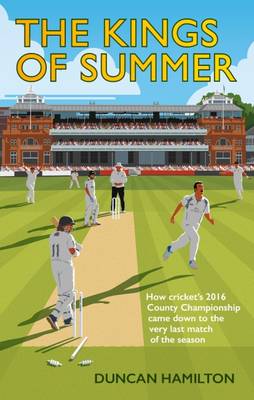The Kings of Summer
Martin Chandler |Published: 2017
Pages: 117
Author: Hamilton, Duncan
Publisher: Safe Haven
Rating: 4 stars

I mentioned this little book from Duncan Hamilton when reviewing Tim Cawkwell’s The Tale of Two Terriers and the Somerset Cat a few weeks ago, something else I found to be a most enjoyable read. A short while later I saw a simultaneous review of both books in The Cricketer, generous in its praise for Hamilton but less so for Cawkwell.
I remain of the view that Sophie Chapman, the reviewer in question, didn’t quite ‘get it’ as far as Cawkwell was concerned. That comment made I would readily concede that the reality may be that because Chapman is young and a professional journalist she doesn’t look at things in quite the same way as Cawkwell and this reviewer, a pair of aging cricket tragics who possess very different skill sets from hers and have to grab our cricket whilst we can, very often on the internet.
Ms Chapman’s one reservation as far as The Kings of Summer was concerned was that Hamilton tended to ramble about Neville Cardus. With that I can only wholeheartedly concur. Cardus is a recurring theme throughout the book, although in my view an entirely appropriate one. I had wondered why Hamilton had been relatively quiet in recent years. I now know. He is working on a biography of the great man. Given that Cardus produced two volumes of autobiography and has already been the subject of at least two biographical works Hamilton is a brave man, but then given the assiduous manner in which he seems to have been approaching his task I would be surprised if the fruits of his efforts were anything less than wholly worthwhile.
In the autumn of his years Cardus acknowledged that by then, the 1960s and 1970s, he could not have got away with writing in the florid way he had in his youth. That however does not in anyway detract from the importance of the first man to write descriptively about cricket and cricketers rather than merely report the game. Hamilton’s regular reminders of Cardus’ stature and importance in cricket literature are timely.
Cardus could not have written in the way that he did without a thorough understanding of the game, and a great enjoyment of it. Vital too was an eye for the sort of detail that most observers will miss, and in that latter respect he and Hamilton are similar. The difference between them is that Cardus was writing for the benefit of those who had seen none of what he was trying to recreate in their minds, whereas almost all of Hamilton’s readers will have seen some of the play that he describes.
The experience of reading The Kings of Summer is not dissimilar to reading A Cricketer’s Book. It is self-evidently easier for me to place myself at Lord’s on the last day of the 2016 cricket season, because I did see some of it on television, but I couldn’t do it without Duncan Hamilton’s help. In a similar way reading Cardus’ acclaimed first book helps my mind’s eye to imagine the strokeplay of Frank Woolley at Lord’s in 1921 during his renowned twin 90s against Warwick Armstrong’s fearsome Australians.
If I were to level a complaint about The Kings of Summer it would be that it does not contain any photographs. I suspect Hamilton’s retort to that, not without some justification, would be that with the quality of his narrative he has painted the picture for me. As indicated I would have to concede that as a fair point but, putting the cricket briefly to one side. I would still have enjoyed a few images of Lord’s containing that rarest of things, a healthy crowd for a County Championship fixture.







Leave a comment